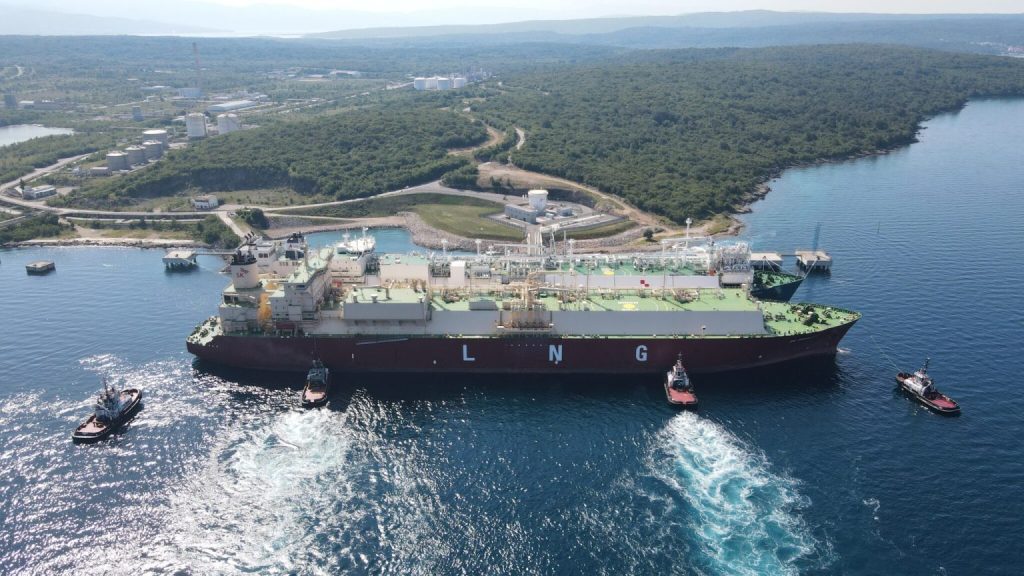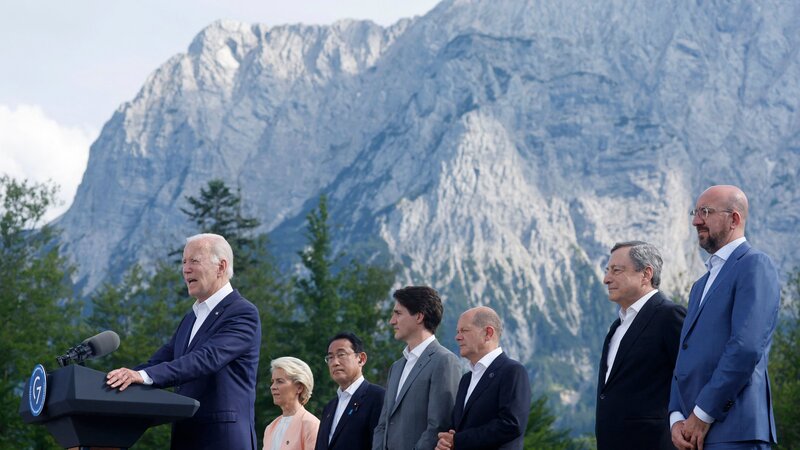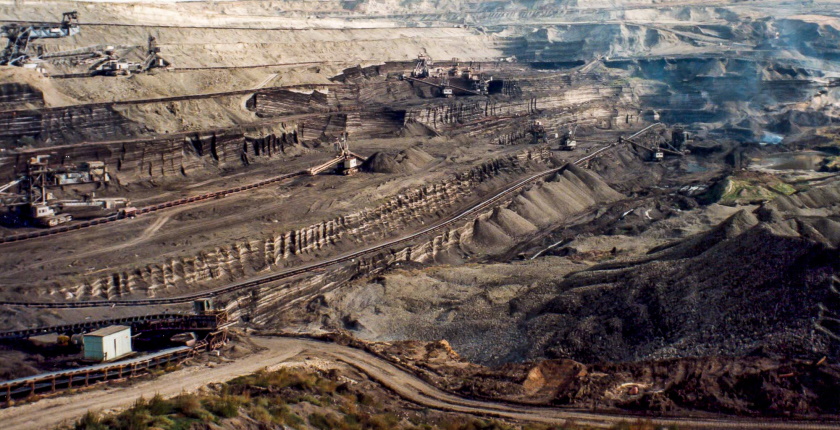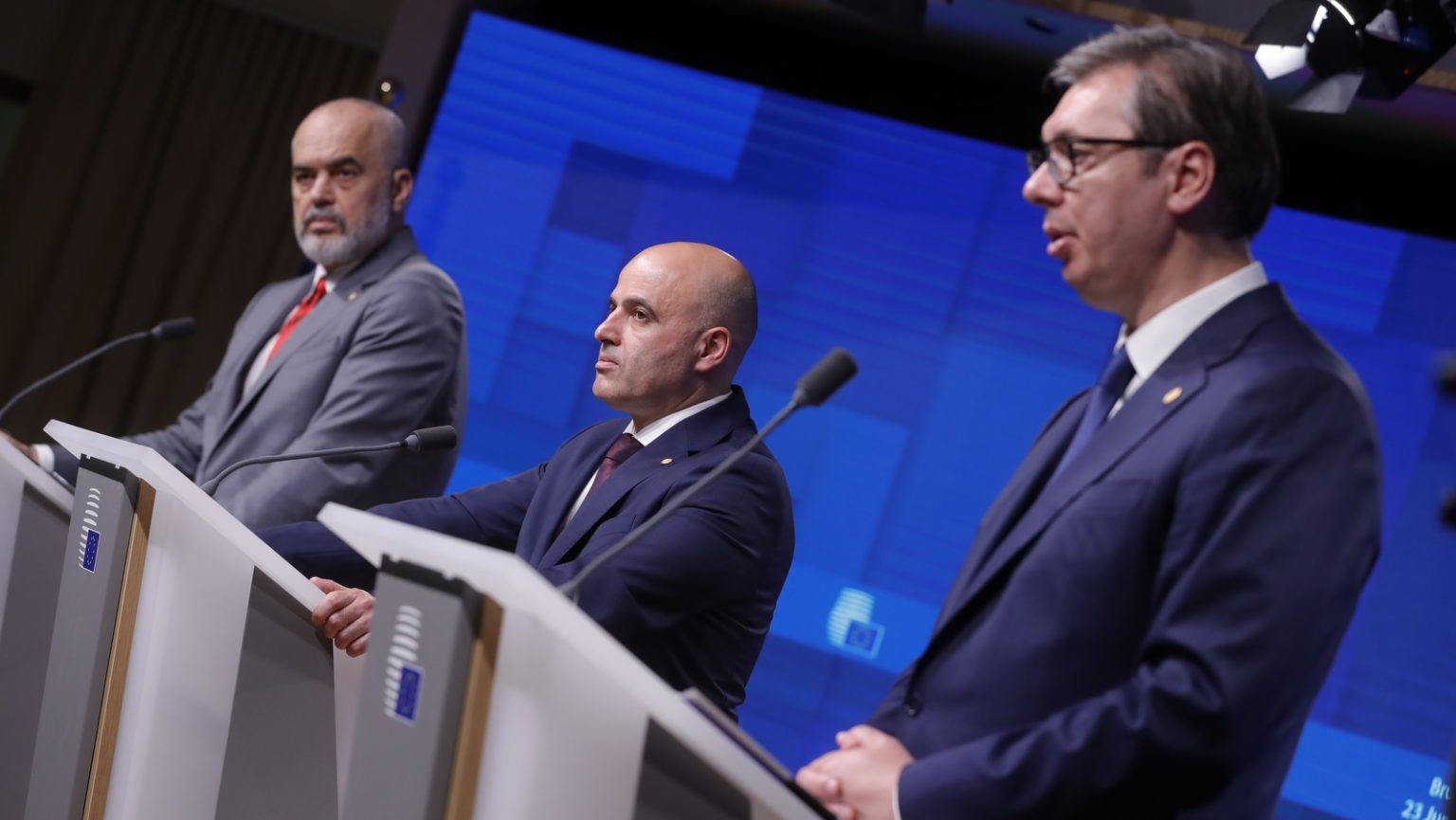Press Reviews
June 2022
International Media Digest
The most relevant events of the area through international sources
FRESH CRISIS IN BULGARIA AS THE GOVERNMENT COALITION DISSOLVES
In June, only six months after assuming office, Bulgaria’s coalition government collapsed following a vote of no confidence in the Parliament. The vote may spark political instability in the country, increasing the likelihood of an early general election and posing additional impediments to the EU enlargement process to neighbouring North Macedonia and to Albania.
The party of liberal and ardent pro-European Prime Minister Kiril Petkov won the elections in November 2021 and created a coalition government with three other parties. However, soon after the Russian invasion of Ukraine, fractures began to form in the coalition. In June, the anti-establishment ITN party, led by comedian Slavi Trifonov, withdrew its support for the government. Former PM Boyko Borisov’s conservative GERB party, for a decade in power before Petkov, promptly filed a vote of no-confidence due to “the failure of the government’s economic and financial policy”, an apparent reference to the increase in inflation due to the war in Ukraine.
At the end of June, in the 240-seat Parliament in Sofia, 123 members voted in favour of the opposition’s motion, while 116 lawmakers voted against it. It was the first time in Bulgarian history that a no-confidence vote had overthrown a government.
The fall of the Petkov’s government has several causes. After a decade of leadership by the controversial former PM Borisov, Petkov pledged to fight against Bulgaria’s systemic corruption and modernise the country. However, the Russian aggression against Ukraine has exacerbated existing fractures in the Bulgarian society and political sphere, in a nation with historically close relations with Moscow. Petkov resisted Moscow’s demand that Bulgaria opens a bank account in roubles to pay for Russian gas, respecting European Union sanctions, despite Bulgaria’s reliance on Russian gas and oil. As a result, Russia cut gas supplies to Bulgaria. An additional source of friction was Ukraine’s request for military aid. While two out of three of Petkov’s government parties were willing to authorise such shipments, the Socialist party, who were also members of the ruling coalition, opposed it. Another significant source of tensions was the long-standing diplomatic conflict between Bulgaria and neighbouring North Macedonia and the Bulgarian veto against opening negotiations with Skopje.
The country now faces possibly its fourth general elections since April 2021. New elections could favour Borisov’s GERB party and pro-Russian parties, according to surveys. Analysts anticipate that a new government will adopt a more neutral stance towards Russia. The political stalemate may also lead to street protests and affects Bulgaria’s efforts to ensure stable natural gas imports before winter.
SERBIA IS OFF-LIMITS FOR LAVROV, AND MOSCOW HITS OUT AT NATO’S MEMBERS IN THE BALKANS
In June, a dispute surrounding a planned visit by Russian Foreign Minister Sergei Lavrov to Serbia demonstrated the Russian influence in the region and the complexity of the existing relations between Moscow and several countries in the region.
Lavrov was supposed to travel to Belgrade to meet Serbian President Aleksandar Vucic just after Belgrade announced a new three-year natural gas supply deal with Russia on favourable terms. Serbia has maintained close relations with Moscow despite the Russian invasion of Ukraine, refusing to join Western sanctions against Moscow. Serbia is formally pursuing EU membership path but sees Russia as its closest ally. Moscow has supported Serbia’s efforts concerning Kosovo, its former southern province that declared independence in 2008.
Lavrov was expected in Belgrade at the beginning of June. However, shortly before the Russian Minister was supposed to travel to Serbia, Moscow and Belgrade confirmed that the visit would not occur. This happened after Bulgaria, North Macedonia, and Montenegro – all NATO member countries – denied Lavrov’s plane permission to fly across their airspace to reach Belgrade. In the Balkans, all countries except Serbia – and to some extent Bosnia and Herzegovina, due to the pro-Serbian positions of Bosnian Serbs – harshly criticised the Russian aggression and joined the sanctions against Moscow. Most of them provided weapons and other military aid to Kyiv and closed their airspace to Russian planes.
The cancelled trip of Lavrov to Serbia enraged Moscow and created problems also in Serbia. Lavrov described the move to block his plane as “unprecedented. “From the Western viewpoint, Serbia mustn’t have any choice and freedom in choosing its partners,” Lavrov claimed.
His spokesperson, Maria Zakharova, underscored that “another channel of communication” with the West and with the Balkans was closed due to the move of Bulgaria, North Macedonia, and Montenegro. Even worse was the position expressed by Russia’s Roscosmos aerospace agency head Dmitry Rogozin, who openly threatened Bulgaria, North Macedonia, and Montenegro by saying that Russia would not ask for permission to hit them with intercontinental ballistic missiles. In the same manner, Serbian Defence Minister Aleksandar Vulin said that a “world in which diplomats cannot seek peace is a world in which there is no peace. Those who prevented the arrival of Sergei Lavrov do not want peace; they dream of defeating Russia”.
However, several sources in Belgrade suggested that the Serbian leadership may have been implicitly content with such developments. The Russian minister’s trip to Belgrade would have indeed further eroded Serbia’s standing in the West after the country refused to impose sanctions on Moscow. Furthermore, it may have hindered the visit of German Chancellor Scholz. Scholz was scheduled to arrive in Serbia just after Lavrov. Slobodan Stupar, an analyst, described Lavrov’s visit to Belgrade as an attempt to “display” Moscow’s power in the Balkans, that finally failed.
Further News and Views
Regional recap

Croatia, Albania and Bulgaria are looking at LNG
Sources: N1, The White House, S&P, LNGPrime, SeeNews, Euractiv
Croatia will increase the capacity of its LNG terminal off the coast of Krk Island from 2,9 billion to 6,1 billion cubic meters, Prime Minister Andrej said. Since the start of operations in 2021, Krk has received already more than 32 cargos. The capacity increase will allow Croatia to become a regional energy hub, which will also benefit neighbouring countries such as Slovenia, Bosnia and Herzegovina and Hungary. Croatia received explicit US support for an initiative that “diversifies their energy supplies away from Russian sources,” the White House said. Albania and Bulgaria are also looking at LNG to diversify their energy sources.

Biden pledges support for a Romanian innovative nuclear project
Sources: World Nuclear News, SeeNews, US Department of State
The United States will commit 14 million dollars toward a front-end engineering and design study that will represent the basis of deploying a small modular reactor (SMR) in Romania, the first of this kind in Europe. President Biden announced this at the G7 summit in Germany. The investment aims at narrowing infrastructure gaps worldwide, increasing energy security and decreasing the dependency on Russian energy sources. The new SMR plant will be built in Doicesti. Other Eastern European countries, including Poland, Slovakia, the Czech Republic and Bulgaria, expressed interest in SMR technology.

Energy crisis in the Balkans, Serbia asks for Kosovar coal
Sources: Balkan Energy News, 21Media, Euronews
In a move indicative of how difficult is the situation in the energy sector in the Balkans, Serbian President Aleksandar Vucic said he would offer Kosovo – its former province with which Serbia has had a profoundly conflictual relationship since it declared independence in 2008 – a barter arrangement for the delivery of lignite to Serbia in exchange for electricity. Vucic added that Belgrade could also pay for the fuel. However, Kurti rejected the proposal, stating that “[t]his is an attempt by the dictatorial president of Serbia to transition from the unsuccessful project of trading territories to that of exchanging coal.” The entire region, not just Serbia, is facing a brutal winter due to the enormous spike in coal, wood, oil and gas prices. Energy will be one of the area’s critical topics in the following months.
Monthly Analysis
The deep dive: strategic trends
BRUSSELS DISAPPOINTS THE WESTERN BALKANS AGAIN ON EU ENLARGEMENT

In June, at a long-awaited EU-Balkans summit and at the European Council meeting, the European aspirations of the states in the Western Balkans were again thwarted, despite governments in the region emphasising the need to advance the enlargement process, particularly in light of the war in Ukraine. In the absence of a quicker EU integration process, some countries in the region also warned of potentially increasing Russian threats and the expansion of other external powers.
However, during both summits, EU leaders failed to break the stalemate over the Balkans’ stalled bid to join the EU while approving the concession of candidate status for Ukraine and Moldova. This latest move was supported in the region but was also viewed as an insult by many in the Balkans, an area in which many countries have been waiting for almost two decades to become members of the EU family.
Particularly worrisome is the situation in Bosnia and Herzegovina (BiH) which, since August 2021, has been rocked by the most severe political crisis in its recent history, and where national elections are scheduled for October this year. Under EU pressure, Bosnian leaders from all ethnic groups, including Bosnian Serb Milorad Dodik, the principal architect of the crisis, signed an agreement in June that guarantees the country’s functionality, integrity, and a clear path to the EU. The agreement stipulates that the Bosnian political leaders will collaborate to preserve a “peaceful, stable, sovereign and independent functional European state of Bosnia and Herzegovina,” to “conduct free and democratic elections,” and pass a series of laws on the judiciary, conflict of interest, and procurement as soon as possible.
With the agreement being signed, many in Sarajevo anticipated that BiH, still with a status of a potential candidate for the EU membership, will finally receive the candidate status at the summit. However, this did not happen at the 23-24 June European Council, although pressures were made by several EU countries, in particular by Slovenia, Croatia and Hungary. The Council merely stated that it “is ready to grant the status of candidate country” to BiH, delegating the Commission to “report” on the progress on critical priorities set in 2019.
No progress was made either in the negotiations with North Macedonia, a candidate country since 2005, and Albania (candidate since 2014). Since 2020, the Bulgarian veto against Skopje, based on long-running historical and linguistic disputes between the two countries, has remained the primary impediment to accession negotiations, with Sofia thwarting Macedonian aspirations, and Albanian aspirations as well, as the integration processes of the two countries are inextricably linked.
However, just after voting on a motion of no confidence against Petkov’s government – and when the European Council had already reached its conclusions – the Bulgarian Parliament unexpectedly accepted a resolution for lifting the veto after the GERB opposition party changed its attitude on the issue. This action could open the path for the resumption of negotiations in exchange for EU guarantees that North Macedonia will meet Bulgaria’s demands. On the other side, Dimitar Kovacevski, the Prime Minister of North Macedonia, dashed hopes for a swift resolution by stating that the plan was “unacceptable in its current form.”
Nevertheless, on June 30, French President Emmanuel Macron said that a compromise solution had been found for the European Union membership negotiation framework for North Macedonia, which would also involve Bulgaria.
No significant steps forward were undertaken concerning the accession negotiations with Serbia and Montenegro, nor towards removing the visa regime for Kosovo.
The lack of decisions at the summits in Brussels increased the frustration of local political leaders in the Balkans. “North Macedonia is a candidate for 17 years if I have not lost count, Albania eight, so welcome to Ukraine,” said Albanian Prime Minister Edi Rama after the EU-Western Balkans leaders’ meeting of June 23, which also ended without any concrete results, but once again with EU leaders expressing their “unambiguous support for integrating the Western Balkans” in the Union. “It’s a disgrace that a NATO country, Bulgaria, kidnaps two other NATO countries, namely, Albania and North Macedonia, amid a hot war in Europe’s backyard with 26 other countries sitting still in a scary show of impotence,” Rama also underscored.
“What is happening now is a serious problem and serious blow to the credibility of the European Union; we are wasting precious time which we do not have at our disposal,” North Macedonian Prime Minister Dimitar Kovacevski said. Kovacevski together with Rama and the Serbian President Vucic even threatened to boycott the EU-Balkans summit in Brussels as a protest for the lack of progress in the accession process. On the other side, several EU member states want the Balkans to focus first on the reforms requested by Brussels and to see a mutual recognition agreement between Serbia and Kosovo.
Despite the delays of the EU and the efforts of China and Russia to exert their influence in the Balkans, the public opinion in the region remains sincerely pro-European, particularly in Kosovo, Bosnia and Herzegovina and North Macedonia.
The Insight Angle
A regional political interview

ZORAN NECHEV
Head of the Center for EU integration
at the Institute for Democracy (IDSCS, North Macedonia);
and Associate Fellow at the German Council on Foreign Relations
EU leaders granted candidate status to Ukraine and Moldova, leaving BiH without the long-awaited candidate status. Moreover, accession negotiations weren’t open with Tirana and Skopje. And there was no visa liberalisation for Kosovo. How damaging could be these new delays in the enlargement process?
These are extremely disappointing outcomes. In terms of the Western Balkans, but for several empty phrases, nothing has moved. This is confirming that the enlargement process continues to be broken despite big promises by EU politicians who visited the region in past three months. The broken accession process cannot reward the performers also because it is excessively misused by EU member states to achieve their own particular interests.
Most of the issues you refer to are European, and must be resolved by the EU itself. I’ll provide two examples. First, the Council decision to open accession negotiations with North Macedonia, and thus Albania, is blocked by Bulgaria. The French Presidency, in attempt to broker a deal in last minute proposed something that opened more questions than it answered. If it was accepted in the way it was proposed, in medium term it would have come to haunt us back very soon. Not only in case of North Macedonia and Bulgaria but in all other countries similar “solutions” could be demanded by neighbours. In short-term, such proposals raised the appetite of Bulgaria, damaging the relations between Skopje and Sofia. It was good that no deal was made but I fear that due to the raised appetite in Sofia it could create circumstances where in the years to come there will be no government in Skopje willing to accept these terms, and no government in Sofia to accept less that what they got from Paris.
Second, Kosovo has fulfilled the conditions set by the European Commission to be granted visa liberalization. However, since many years, even though this decision does not need unanimity, the EU member states cannot reach a decision, putting citizens in a very bad and unjust position of being the only Western Balkans country without the possibility for a visa-free travel. *
What about Bosnia?
Member states have said they would be ready to grant Bosnia and Herzegovina candidate status. To do that, they need two things. First, European Commission’s report on implementation of the 14 priorities it set in May 2019, which is expected in autumn together with other country report. Second, they need to see progress in implementation of these priorities. Will this happen? Maybe, but taking into account that country is heading to elections in October, it is hard to imagine its politicians putting their differences and election campaign aside to implement reforms, of which some require constitutional reforms. In particular when they see what happened to North Macedonia, Albania and Kosovo, which implemented reforms but still are waiting for a positive EU decision. While many in Brussels and member states capitals will jump to blame Bosnian politicians, to some extent rightfully, this lack of appetite for EU reform cannot be detached from an overall disappointment in the region with EU’s lack of response to those that do reform.
There is a growing sense of disillusion in the Balkans, both among people and political leadership, regarding the European integration process. Who’s more ‘guilty’ for the delays?
An unproductive blame game does not help anyone in the process. In general, both sides have contributed to this situation. But they have all agreed that this region, these countries from the Western Balkans will become members of the EU. Of course, if and when they do reforms. The only acceptable way forward is to proceed with full steam towards integrating those countries that have completed reforms and align with the EU. In this new geopolitical reality with the unjustified and unprovoked Russian invasion of Ukraine, EU and the Western Balkans need to work together to find the necessary political will and interest to see enlargement happening. The solution of this puzzle goes beyond the region in question. If nothing moves in the next weeks/months, the candidate status of Ukraine and Moldova would not mean anything; on the contrary, the eventual disillusionment, if things do not evolve in a positive way in the future, will help Russia achieve its goals and objectives that it could not by military means. And will make EU obsolete beyond its borders, proving it is no longer able to model European architecture.
Even before the war, Russia has been exerting various kinds of pressure on several countries in the Balkan. Do you expect, without an EU decisive action, that Moscow could increase its influence in the region? And how?
Russia, through its peacekeepers, left the Western Balkan region in 2003. Ever since, the only game Putin played in the region is one of a spoiler. However, following the West’s response to the war in Ukraine, I’d expect Russia’s come back to the region in a vengeance mode. By scaling-up its efforts, it could try to exploit all possible loose ends, especially and starting with Bosnia and continuing to held hostage the enlargement process by influencing political elites in Sofia. How much these efforts will be successful depends entirely on the seriousness of the political leadership in Bosnia, including the ones in Serbia, and on the EU willingness to bring these countries back in the EU accession process. The snail-like pace of integration provides Russia with ample opportunities to play its game. A decisive action towards full integration in the EU will change the situation overnight on a positive and Russia’s spoiler tactics will become unsuccessful. The EU must acknowledge how fundamentally the world has changed with Russia’s war on Ukraine and what immense responsibility it has to make choices that are right and resolute at this particular time.
While the EU integration process is stalled, the Balkans are waiting for winter with growing fears. Inflation, rapid increase of food and fuel prices, and possible energy supply disruptions are among the challenges expected. Are you concerned about a destabilisation of the region?
The uncertainty that the Russian aggression on Ukraine produces is immense, not only for the Western Balkans but also for Europe as a whole. The Western Balkan countries have some of the highest levels of dependence on Russian gas, therefore, the expected economic and energy crisis is an additional layer that will hit hard the economies in the Balkans, already financially vulnerable due to the Covid-19 crisis. I don’t envisage immediate destabilization with regards to the region’s stability and security, however, if this uncertainty continues it will surely have profound consequences on the region. Thus, the EU needs to inject substantial financial means in order to address the development challenges of these countries and prevent the population exodus that is currently happening.
*This interview was made before Macron’s statement on June 30.

Stefano Giantin
Journalist based in the Balkans since 2005, he covers Central- and Eastern Europe for a wide range of media outlets, including the Italian national news agency ANSA, and the dailies La Stampa and Il Piccolo.

